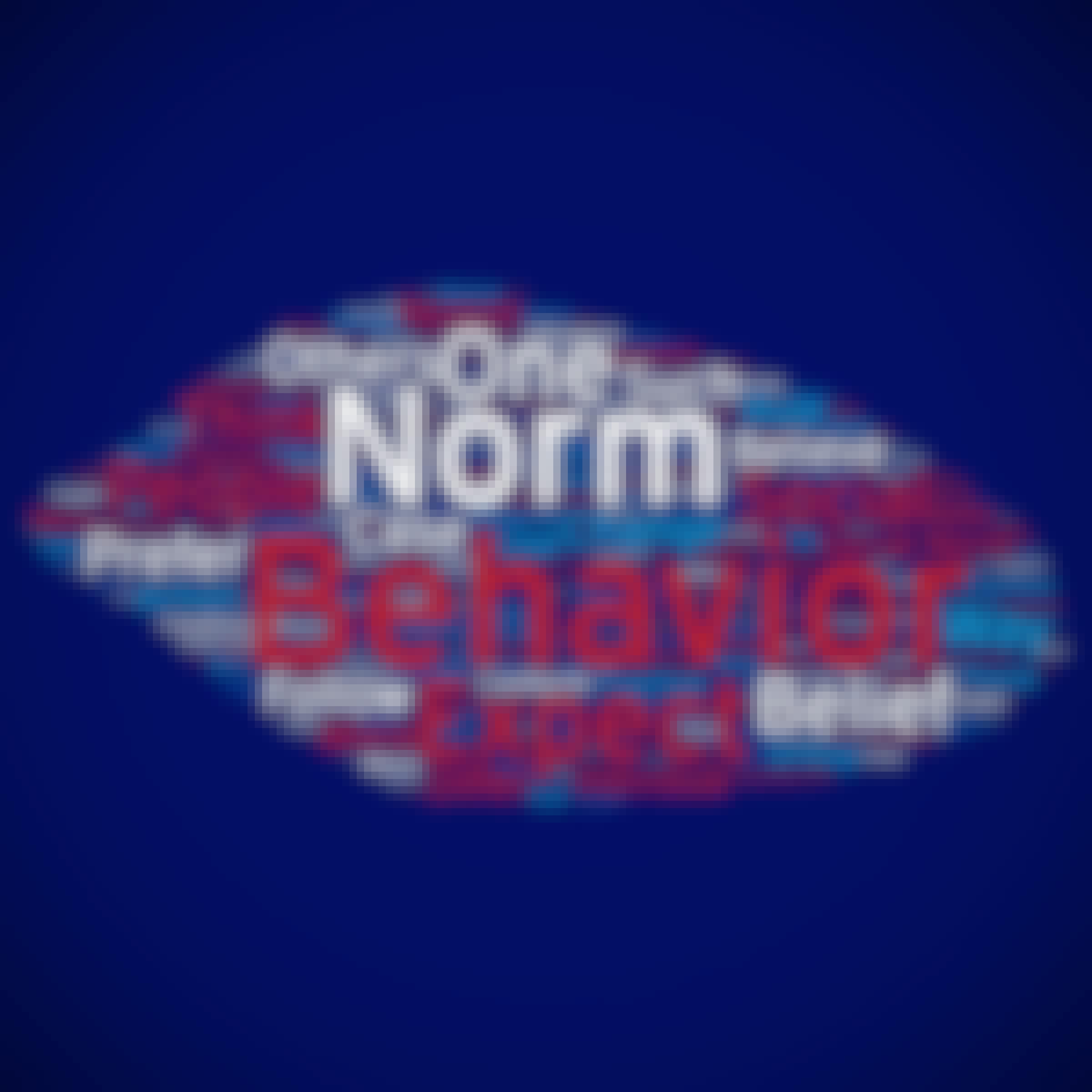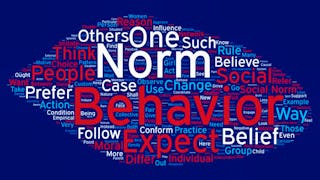Filter by
SubjectRequired
LanguageRequired
The language used throughout the course, in both instruction and assessments.
Learning ProductRequired
LevelRequired
DurationRequired
SkillsRequired
SubtitlesRequired
EducatorRequired
Results for "social norms"

University of Pennsylvania
Skills you'll gain: Sociology, Social Sciences, Economics, Policy, and Social Studies, Public Policies, Cultural Diversity, Behavioral Economics, Surveys, Qualitative Research, Research

University of Pennsylvania
Skills you'll gain: Public Policies, Policy Analysis, Social Sciences, Sociology, Community Development, Cultural Diversity, Trend Analysis, Psychology, Media and Communications

University of Cape Town
Skills you'll gain: Design Thinking, Human Centered Design, Innovation, Creative Thinking, Community Development, Resourcefulness, Social Justice, Systems Thinking, Complex Problem Solving, Cultural Diversity, Growth Mindedness, Empowerment, Entrepreneurship, Personal Development, Resilience
 Status: Free Trial
Status: Free TrialUniversity of California, Davis
Skills you'll gain: Network Analysis, Data Wrangling, Natural Language Processing, Web Scraping, Social Sciences, Data Ethics, Databases, Artificial Intelligence, Research, Simulations, Big Data, Systems Thinking, Data Science, Research Methodologies, Machine Learning, Data Collection, Computational Thinking, Graph Theory, Economics, Policy, and Social Studies, Data Analysis
 Status: Free Trial
Status: Free TrialSkills you'll gain: Social Media Marketing, Social Media, Target Audience, Social Media Strategy, Social Media Management, Marketing, Key Performance Indicators (KPIs), Goal Setting, Facebook, Customer Analysis, Marketing Strategies, Marketing Channel, Instagram, Digital Marketing

Wesleyan University
Skills you'll gain: Social Sciences, Psychology, Persuasive Communication, Behavior Management, Conflict Management, Interpersonal Communications, Cultural Diversity, Research, Ethical Standards And Conduct, Experimentation
What brings you to Coursera today?
 Status: Free TrialStatus: AI skills
Status: Free TrialStatus: AI skillsSkills you'll gain: Paid media, Social Media Marketing, Social Media Management, Social Media, Marketing Analytics, Target Audience, Marketing Budgets, Social Media Strategy, Social Media Campaigns, Instagram, Content Creation, Campaign Management, Marketing Effectiveness, Marketing, Performance Analysis, Key Performance Indicators (KPIs), Goal Setting, Presentations, Brand Management, Digital Marketing

University of Toronto
Skills you'll gain: Health Disparities, Mental Health, Psychiatry, Community Health, Socioeconomics, Social Sciences, Cultural Diversity, Mental and Behavioral Health, Cultural Sensitivity, Caregiving
 Status: Free Trial
Status: Free TrialNorthwestern University
Skills you'll gain: Blogs, Social Media Marketing, Integrated Marketing Communications, Social Media, Peer Review, Social Media Management, Key Performance Indicators (KPIs), Social Media Strategy, Real Time Data, Marketing Effectiveness, Content Marketing, Strategic Marketing, Marketing Strategies, Marketing, Target Audience, Social Media Campaigns, Budgeting, Analytics, Digital Marketing, ChatGPT
 Status: Free Trial
Status: Free TrialSkills you'll gain: Social Media Management, Social Media Marketing, Content Creation, Social Media Strategy, Social Media Campaigns, Content Marketing, Instagram, Content Management, Content Performance Analysis, Brand Management, Facebook, Branding, Customer Engagement

University of Amsterdam
Skills you'll gain: Sociology, Social Studies, Social Sciences, Socioeconomics, Culture, Political Sciences, Economics, Qualitative Research, Research Methodologies

Stanford University
Skills you'll gain: Network Analysis, Social Sciences, Sociology, Economics, Policy, and Social Studies, Game Theory, Behavioral Economics, Mathematical Modeling, Markov Model, Bayesian Statistics, Probability Distribution, Simulations
Searches related to social norms
In summary, here are 10 of our most popular social norms courses
- Social Norms, Social Change I: University of Pennsylvania
- Social Norms, Social Change II: University of Pennsylvania
- Becoming a changemaker: Introduction to Social Innovation: University of Cape Town
- Computational Social Science: University of California, Davis
- Introduction to Social Media Marketing: Meta
- Social Psychology: Wesleyan University
- Meta Social Media Marketing: Meta
- The Social Context of Mental Health and Illness: University of Toronto
- Social Media Marketing: Northwestern University
- Social Media Management : Meta










